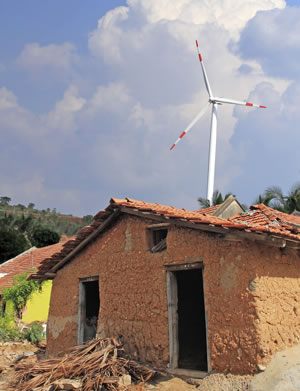A RECORD YEAR FOR RENEWABLES
Last year saw the fastest ever increase in renewable energy sources, with investments hitting US$286 billion – a 5% increase from 2014 – according to a new report. The Renewables 2016 Global Status Report by the Renewable Energy Policy Network for the 21st Century (REN21) also showed that, for the first time, developing countries outspent developed countries on renewable energy development.
China invested more than any other country, accounting for a third of all spending. India, South Africa, Mexico and Chile also saw major increases in green energy investments. Green energy investment actually fell in developed countries, largely due to a slowdown in spending in Europe. The report suggests that developed countries should implement better policies to support investment.
Globally, spending on renewables was double that spent on new coal- and natural-gas-fired power generation, with 147GW of renewable energy capacity added in 2015. More than half of all investment was in solar power, with wind a close second. Other renewable energy sources trailed far behind, and hydropower and biofuels fell compared to the previous year.
The G7 nations have pledged to end “inefficient” fossil fuel subsidies within the decade, finally setting a deadline for the ambition after seven years of discussion. “Inefficient” subsidies distort energy markets, and are estimated to cost US$160–200 billion a year in OECD member nations alone, rising to a staggering US$5.3 trillion a year, or US$10 million per minute, when the cost of damage from pollution and climate change is factored in – more than the total global spend on human health.
Despite the pledge, G7 member countries including the UK, Germany, Japan and Canada have been criticised recently for betraying the spirit of the Paris agreement by increasing fossil fuel subsidies.
PACIFIC ISLANDS MAY BAN FOSSIL FUELS
Leaders of 14 Pacific Islands nations have agreed to consider the world’s first international treaty to ban or phase out fossil fuels. If agreed, the proposed treaty will bind signatories to meet renewable energy targets, ban construction or expansion of fossil fuel mines and not provide fossil fuel subsidies. It will also set mitigation and adaptation targets in line with the aspirational 1.5 °C target set in the Paris agreement – which was criticised by environmental groups for not being legally binding. After consultation next year it is possible the treaty could be adopted in 2018.
OPPOSITION GROWS TO AMAZON DAM
Support for the Indigenous Munduruku people, who are fighting to stop the São Luiz do Tapajós (SLT) mega-dam project in their Amazon homeland, has reached one million people. The SLT hydropower project would destroy the livelihoods of the Munduruku and create a 729km² reservoir – almost the size of New York City – in the heart of the Amazon.
Greenpeace is demanding that multinational corporations publicly commit not to participate in the project.








